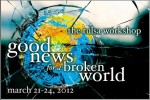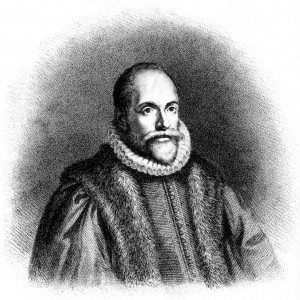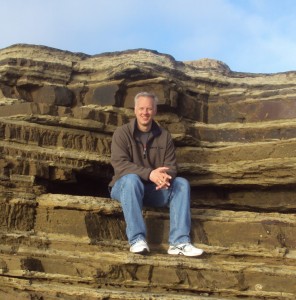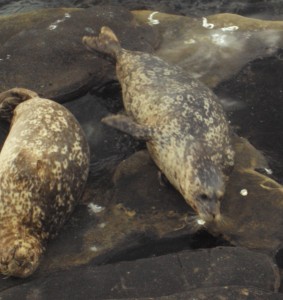 Walter Brueggemann looks and acts like a cartoon character. A tiny little man with white hair and eyeglasses that hang way too close to the end of his nose, this most respected of Old Testament scholars and expert on the ancient prophets, was in Abilene as a guest speaker at this week’s annual ACU Summit. The headliner, so to speak, wowed us with his deep insights and wisdom. He moved effortlessly from difficult text to even more difficult application. He seemed to whisper and shout at the same time, raising his eyebrows, cocking his head to one side, dragging the last words of key sentences for almost half a minute in a whiny, yet authoritative, rasp, and all the while wringing his oversized hands in an exaggerated fashion in front of his face. It would be very easy to imitate Brueggemann’s style. It’s hilarious. And fascinating.
Walter Brueggemann looks and acts like a cartoon character. A tiny little man with white hair and eyeglasses that hang way too close to the end of his nose, this most respected of Old Testament scholars and expert on the ancient prophets, was in Abilene as a guest speaker at this week’s annual ACU Summit. The headliner, so to speak, wowed us with his deep insights and wisdom. He moved effortlessly from difficult text to even more difficult application. He seemed to whisper and shout at the same time, raising his eyebrows, cocking his head to one side, dragging the last words of key sentences for almost half a minute in a whiny, yet authoritative, rasp, and all the while wringing his oversized hands in an exaggerated fashion in front of his face. It would be very easy to imitate Brueggemann’s style. It’s hilarious. And fascinating.
But it would be impossible to duplicate his substance.
The old professor reminded us that our God has a high regard for his people but our God also has a high self-regard for God. Both. Brueggemann pointed out that our therapeutic culture mostly thinks God is only in it for us. He loves us, he forgives us, he restores us, he’s patient with us, he saves us because, afterall, that’s what God does. It’s his job. We would do good, however, to wake up. It would benefit us greatly to become like the child who wakes up one day to discover that her mom has a life of her own. Our God is a free agent. He chooses. He wills. He decides. And he changes his mind. His eternal holiness trumps everything else about him. Therefore, he is both a passionate and punishing God. Both.
I hope to write a little more about Summit, particularly Brueggeman’s brilliant insights, in the following couple of days. (Anybody who can drop cuss words from the pulpit in both ACU’s chapel on the hill and Moody Coliseum merits more than just a couple of paragraphs in this space. We were all shocked when Mark Hamilton prayed before Brueggemann’s afternoon keynote that God would “loosen his tongue.” Had Brother Hamilton not attended any of the earlier sessions?)
But, here’s what I really want to write about today. That was all just an introduction.
I have a tendency, personally, to think and talk about the Churches of Christ in apologetic terms. In my defense, most of the negative things I think and say about my faith heritage are in the past tense: we used to be this, we’re trying to get away from that, we’ve always thought this way, we’re changing the way we do that, etc., But, still, the truth is, when somebody brings up the Church of Christ in a conversation, my gut instinct is to apologize. We used to think we were the only ones going to heaven, but we’re moving away from that. We used to abstain from working with other Christian denominations, but we’re getting better. We’ve traditionally taught and practiced a works-based salvation, but our understanding is much better now. We used to ignore the Holy Spirit, but not anymore.
You know what I mean? Do you do that, too? There’s so much good going on in our particular branch of God’s Kingdom, we have so much to offer the Christian community and the world. And I know that. I talk about it all the time with our own people. I see so much good, I experience so much joy, I hear so many wonderful things. But, still, my default is to apologize first.
After his morning keynote at ACU, Brueggemann was asked by moderator Brady Bryce to share his first impressions of the Church of Christ. And it wasn’t a fair question. Up until the moment he arrived on campus Sunday, I’m not sure Brueggemann had ever seen a Church of Christ member in person. I wouldn’t bet he’d ever heard of the Church of Christ before Brady called him last year. It wasn’t right to ask this Episcopalian and UCC scholar to share his thoughts on our movement in front of all of us. He begged out, but Brady pushed.
And Brueggemann said he was very impressed with the immediacy and the urgency with which we approach Scripture. He said our interpretation of the Bible was simple and fresh. He said our teachings and approach to faith and life in Christ were not complicated. And, again, “fresh.”
Fresh? Did you ever think you would live to hear a world renowned scholar refer to anything related to the Churches of Christ as “fresh?”
Now, to be fair, Brueggemann had spent a couple of days by this time listening to our best speakers and worshiping with our best singers. I know he was paying attention because he referred to and quoted from several of the sermons we had heard since Sunday night. And he specifically cited the immediacy and urgency with which we approach Scripture as fresh.
This outsider who has a keen eye for what’s faithful and good, this alien scholar who thinks so well and only says what he really thinks — this esteemed man of God had a first impression of us. And it was good. It was very good.
When am I, a lifelong CofC insider, going to fully get over the past so I can wholeheartedly embrace the present and the future of our denomination? Our present is exciting and our future is promising. Brueggemann’s first blush reminded me that we are brimming with holy potential for the great cause of our Christ. We are important in the Kingdom of God. We do have a lot to offer. I knew this already, I’ve known it for a long time. But it’s good to hear it from an outsider, to be reminded by someone who’s not nearly as concerned about our past as I am.
As of today, thanks to Walter, I’m done apologizing. I’m through with qualifying the wonderful attributes of our movement with backward glances at our struggles. I’m not ever going to shrink back from my CofC heritage again. And I may even take up hand-wringing during my sermons.
~~~~~~~~~~~~~~~~~~~
 I started writing this blog when I began my first full-time congregational preaching with the Legacy Church of Christ in June 2007. Today’s post is #985. I’m thinking that post #1,000 will happen before the end of October. And on that day, I’d like to celebrate by giving away brand new copies of some of the books that have radically shaped my thinking, my preaching, and my writing. Now, this is not going to be like Oprah — I’m not giving away any cars or houses — but I do want to distribute some excellent books.
I started writing this blog when I began my first full-time congregational preaching with the Legacy Church of Christ in June 2007. Today’s post is #985. I’m thinking that post #1,000 will happen before the end of October. And on that day, I’d like to celebrate by giving away brand new copies of some of the books that have radically shaped my thinking, my preaching, and my writing. Now, this is not going to be like Oprah — I’m not giving away any cars or houses — but I do want to distribute some excellent books.
Everyone who posts a comment on my blog between now and that 1,000th writing will automatically be entered in a drawing for the books. You can only be entered once per post during that time. You can only be entered a maximum of 14 times. You’ll only get credit for one entry per post regardless of how many comments you write per post. But it does start today. I’ll reveal the titles of the books tomorrow. The judge’s decisions (mine) are final. Good luck.
Peace,
Allan















Recent Comments